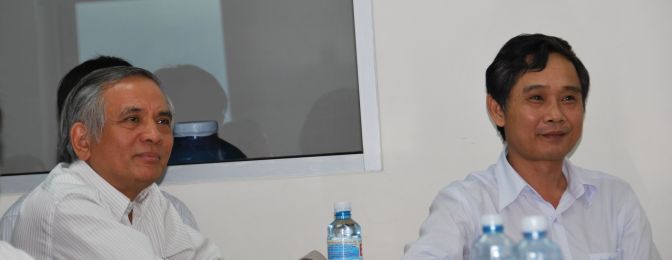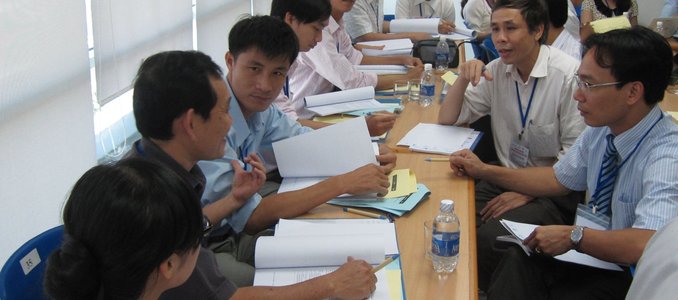
Vietnam follows in the steps of Turku
A project of Turku University of Applied Sciences has presented Finnish pedagogics and innovative learning environments to Vietnamese universities. The project, which included teacher and student visits, has improved the connections of Vietnamese students with local working life.
Text: Johanna Rytkönen, student of journalism
Photos: Lea Oksanen & Janne Roslöf
Lecturer in Business Administration Markku Rajala visited Danang with a three-person delegation in April 2013. The theme of the week-long workshop was innovative learning methods. The representatives of three Vietnamese universities learned about the group work methods used by TUAS, the BisnesStartti learning environment and the CDIO curriculum method targeted at engineers.
– The presented teaching methods are based on teamwork and increasing information in a group. The reception was positive and eager, but there were some challenges because there the numbers of students are much greater than ours. It is somewhat more challenging to use a method which tries to teach in another way, says lecturer Rajala
The Vietnamese government programme includes an educational reform, which is hoped to be influenced by Finnish pedagogics. At the moment, the educational sector is large and bureaucratic, and the teaching is very traditionally class-room based. The teacher talks and students listen. The degrees do not include work placement or other connections with working life, either.
New company partners to Vietnamese universities
The visits to Vietnam are a part of the SILE – Supporting Innovative Learning Environments project of Turku University of Applied Sciences. The cooperation partners are three Vietnamese universities. The project has included several visits to Vietnam and the cooperation partners have also visited Turku. In addition, three students from each country have completed a student exchange.

Thanks to the project, the Vietnamese universities got their first company partners. In addition, the students founded a cooperative, through which they can conduct projects for working life in exchange for money. Through the cooperative, the money comes to the students who participate in the projects.
– Vietnam has a long tradition in terms of cooperatives. They know the model and the way of action, but they had never thought that it could be benefited in connection with studying. Now such a pilot cooperative exists in Danang, says Head of Education and Research Jaana Kallio-Gerlander.
Further financing is currently being applied for the SILE project, which is supported by the Ministry for Foreign Affairs in Finland. The plans include, among others, training for teaching and management staff.
The research group combines business competence and mobile services
The SILE project is a part of the activities of TUAS’ research group Innovative Business and Entrepreneurship. The purpose of the research group is to support TUAS’ staff in project work and its composition varies according to ongoing projects. The research group has two lines of operation: the first one focuses on promoting business and entrepreneurship mainly in the SME sector, where the companies often do not have enough resources for long-term development. The second line of operation focuses on ICT services and especially mobile services.
– We have lots of faith in mobile services. All kinds of entertainment applications exist, but another question is if they make the everyday life easier in any way. We try to produce real everyday value for people, so that mobile apps could actually become profitable business.
In the research group activities, however, mere knowledge of facts is not enough. Knowing intercultural communication is important in joint projects. In Vietnam, for example, formality matters. People do business with people of equal value. The Vietnamese are also very interested in the cultural background of their cooperation partners. Being able to tell about the history of one’s people is a good thing.
– The Vietnamese are straightforward in comparison with, for example, the Chinese. They also pose questions and challenge you. They are an exciting mix of straightforwardness and Asian courtesy. Finns have it quite easy there, Jaana Kallio-Gerlander sums up.